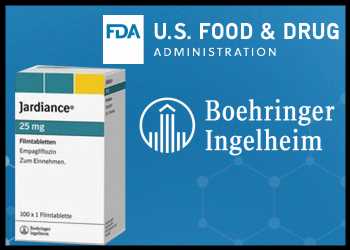
FDA Approves Jardiance To Treat Adults With Heart Failure
The U.S. Food and Drug Administration or FDA approved Boehringer Ingelheim’s diabetes drug Jardiance (empagliflozin), co developed by Eli Lilly and Co., to mitigate the risk of cardiovascular death and hospitalization for heart failure in adults.
Heart failure is a syndrome in which the heart is not meeting the needs of the body. The issue affects more than 650,000 people in the U.S. each year, and mortality remains high. Heart failure becomes more common with age and is the leading cause of hospitalization in people over 65 years old.
Jardiance’s approval was based on its safety and effectiveness that were evaluated as an adjunct to standard of care therapy in a randomized, double-blind, international trial. In this, 2,997 participants who received Jardiance, 10 mg, once daily were compared to 2,991 participants who received the placebo.
The main efficacy measurement was the time to death from cardiovascular causes or need to be hospitalized for heart failure.
Among the patients who received Jardiance for an average of about two years, 14 percent died from cardiovascular causes or were hospitalized for heart failure, compared to 17 percent of the participants who received the placebo. The agency noted that the benefit was mostly attributable to fewer patients being hospitalized for heart failure.
Jardiance received Priority Review designation for this indication.
Jardiance was originally approved by the FDA in 2014 as a supplement to diet and exercise to improve glucose control in adults with type 2 diabetes.
The treatment is also approved to reduce the risk of cardiovascular death in adults with type 2 diabetes and established cardiovascular disease, and to reduce the risk of death and hospitalization in patients with heart failure and low ejection fraction.
In clinical studies with Jardiance, the side effects for patients with heart failure were generally consistent with side effects for patients with diabetes.
The approval coincides with February’s annual observance of American Heart Month, which is a reminder for individuals to focus on cardiovascular health.
Source: Read Full Article